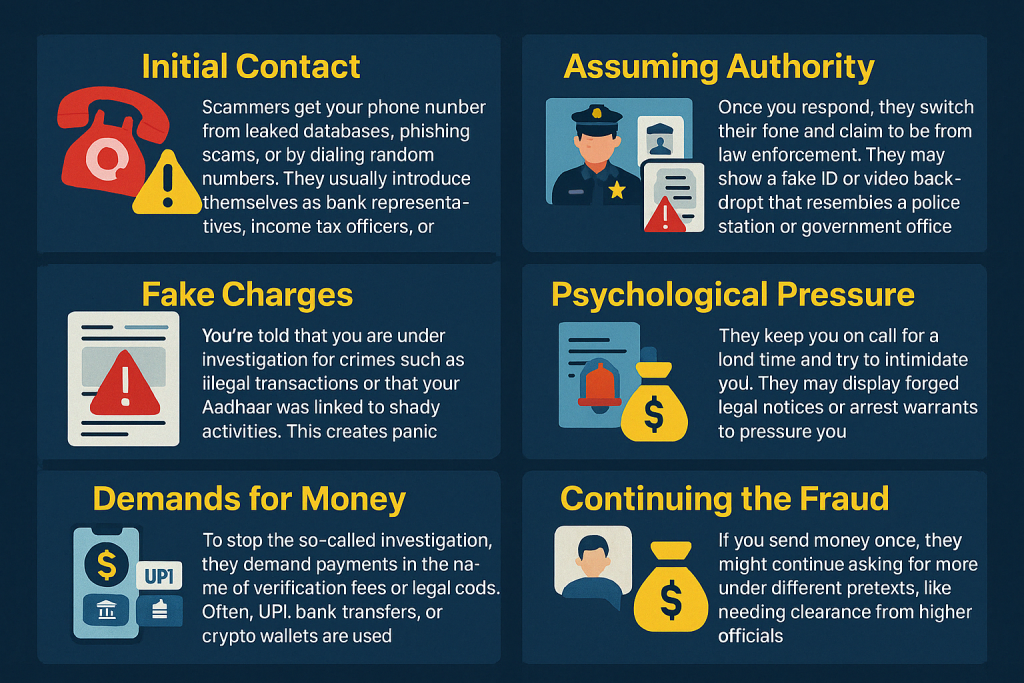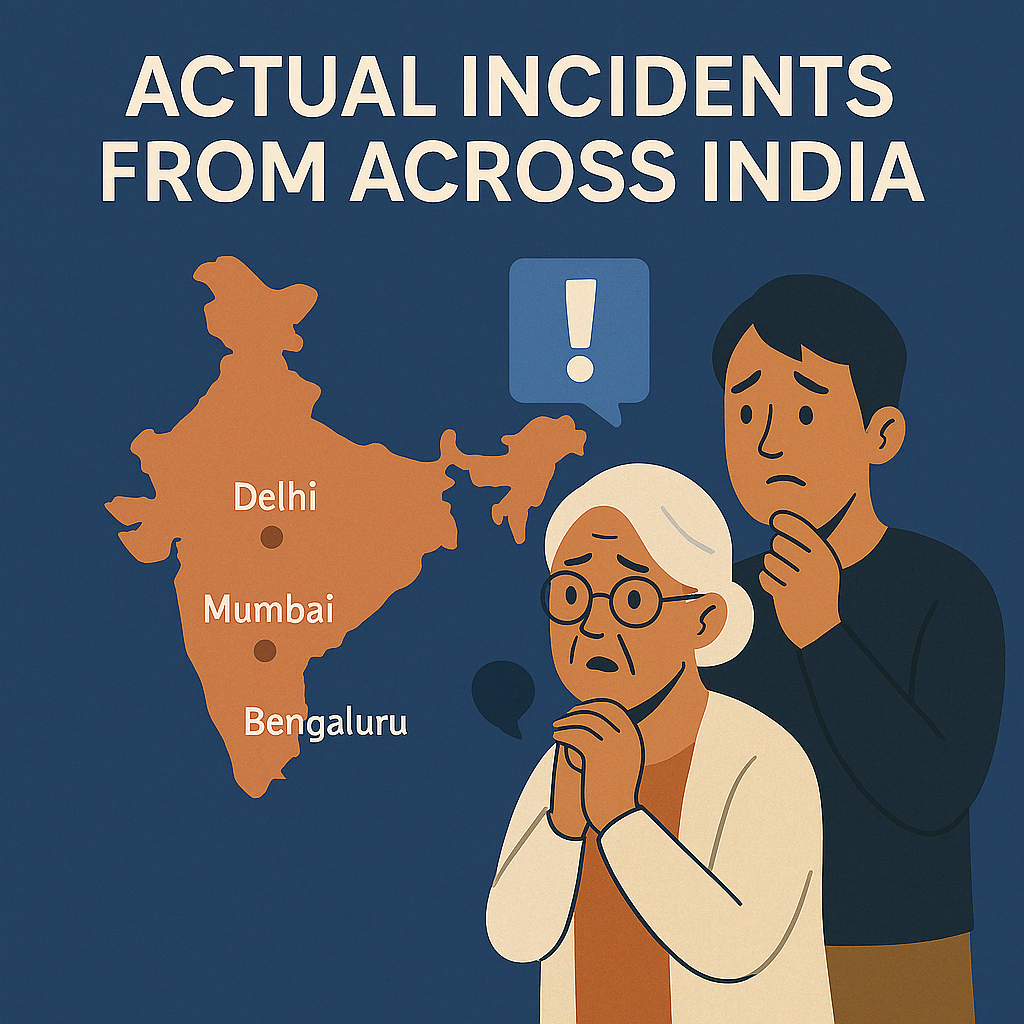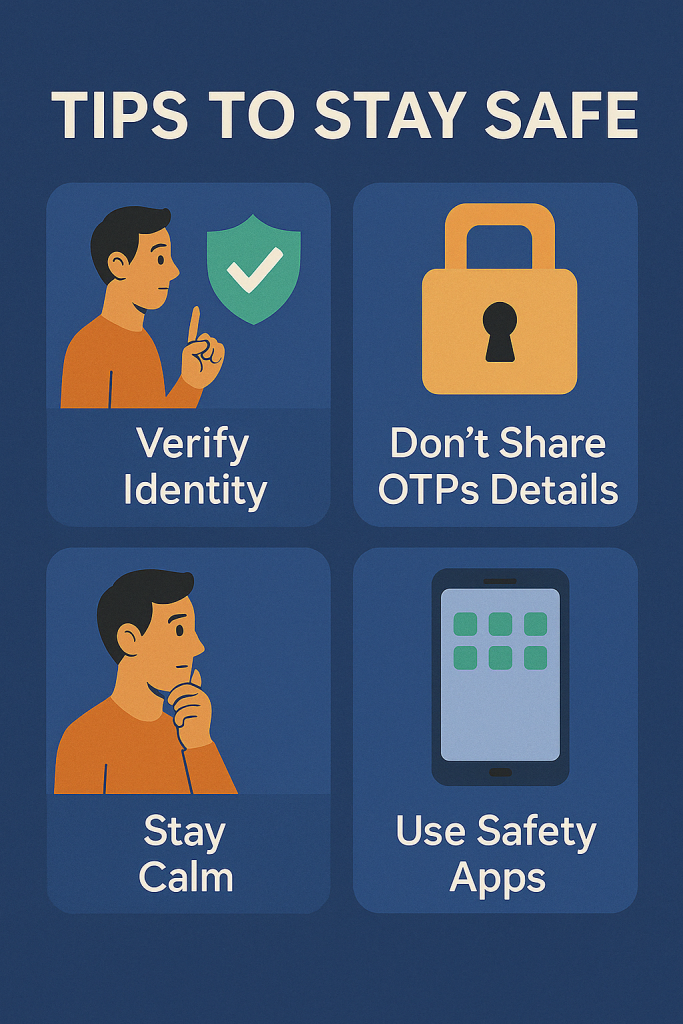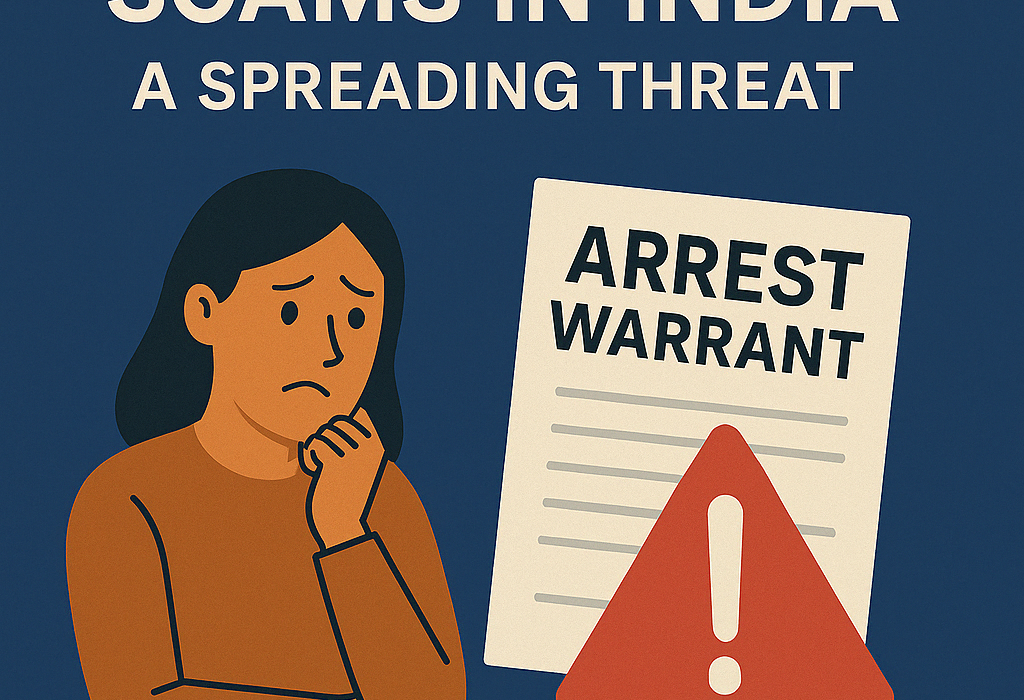Introduction: Lately, there have been increasing cases of scams in India called “digital arrest scams.” Scammers call people pretending to be police or government officials and tell them they’re involved in serious crimes like money laundering. Then, they scare them by saying they’ll get arrested unless they pay up.
What’s scary is that this isn’t just limited to metro cities anymore—these scams are now reaching smaller towns too, leaving innocent people confused, scared, and out of their savings. It’s also damaging the trust people place in official digital systems by the government.
In this blog, we’ll explore how these scams work, why people fall for them, how they affect individuals and the broader economy, and most importantly—how you can stay protected and help your family do the same.
What Is a Digital Arrest Scam?
A digital arrest scam occurs when someone impersonates an official and falsely accuses you of a crime. They might claim you’re involved in something illegal and use fear tactics to push you into transferring money.
These fraudsters often use video calls, doctored IDs, and digital backdrops to make their claims look authentic. With the rise of AI-based tools, scammers can mimic official voices, produce fake documents, and spoof caller IDs to make their operations more believable.
Sadly, even people from small towns and rural areas—just beginning to use digital platforms—are becoming targets.

Step-by-Step Breakdown of the Scam
- Initial Contact: Scammers get your phone number from leaked databases, phishing scams, or by dialing random numbers. They usually introduce themselves as bank representatives, income tax officers, or courier agents.
- Assuming Authority: Once you respond, they switch their tone and claim to be from law enforcement. They may show a fake ID or video backdrop that resembles a police station or government office.
- Fake Charges: You’re told that you are under investigation for crimes such as illegal transactions or that your Aadhaar was linked to shady activities. This creates panic.
- Psychological Pressure: They keep you on call for a long time and try to intimidate you. They may display forged legal notices or arrest warrants to pressure you.
- Demands for Money: To stop the so-called investigation, they demand payments in the name of verification fees or legal costs. Often, UPI, bank transfers, or crypto wallets are used.
- Continuing the Fraud: If you send money once, they might continue asking for more under different pretexts, like needing clearance from higher officials.

Why People Fall for These Scams ?
- Fear and Panic: The idea of being falsely accused of a crime causes immediate stress, making people more vulnerable. most of the times people do not focus on details once they are in a panic situation.
- Professional Appearance: Scammers use real-sounding legal terms like “FIR” or “judicial remand” to appear genuine.
- Keeping Victims Isolated: They insist on not hanging up or telling anyone, claiming the matter is confidential. This isolates victims and makes it easier to manipulate them.
- Lack of Tech Awareness: People unfamiliar with legal or digital processes—especially the elderly and new users—are easy to deceive.
Actual Incidents from Across India
In 2024, multiple cases were reported across metros like Delhi, Mumbai, and Bengaluru. In one shocking case, a Mumbai resident lost Rs. 16 lakh after being told her Aadhaar was misused. Another victim in Bengaluru paid Rs. 12 lakh over a four-hour call during which forged documents were shown.
From young professionals to retirees, no group is immune. The key similarity in all these cases is the scammer’s ability to create fear and urgency.

Impact on Society and Economy
- Financial Damage: Victims lose lakhs of rupees, often money saved for emergencies, weddings, or education. Many don’t report it due to shame.
- Distrust in Technology: People question genuine communication from banks, police, and government platforms.
- Psychological Distress: Being scammed leaves emotional scars. Victims often report anxiety, trust issues, and even depression.
- Hindrance to Digital India: As trust in online systems drops, progress toward a cashless and connected society slows.
- Digital arrest scams aren’t just personal threats—they ripple through the economy, just like disruptive trends in emerging sectors. Here’s an example of a growth-side trend: how India is navigating EV investments in 2025.
Tips to Stay Safe
- ✅ Verify Identity: Verify Identity Ask for badge numbers and official emails. Always disconnect and confirm using trusted sources.
- ✅ Don’t Share OTPs or Details: Don’t Share OTPs or Details Police or government officials will never ask for OTPs, passwords, or payment through phone calls.
- ✅ Stay Calm: Stay Calm Pause and don’t act out of fear. Contact a family member or friend before making decisions.
- ✅ Use Safety Apps: Use Safety Apps Install caller ID apps and report any suspicious number. Block unverified contacts
- ✅ Spread Awareness: Spread Awareness Talk to parents, elders, and children in your home about these scams.

What to Do If You're Targeted
- https://cybercrime.gov.in
- Dial 1930 – cybercrime helpline 1930 India’s national cyber fraud helpline.
- Inform your bank and stop any recent transactions.
- If something feels off or you’ve lost money, go to your nearest police station and file an FIR. It’s necessary to report it officially.
Government Initiatives
To counteract this wave of cyber fraud, the Indian government has launched campaigns and educational drives. State and central agencies are increasing surveillance and working with global firms to track scammers who operate from abroad.
Legal cases are being built under the Information Technology Act and IPC sections. Stronger digital verification laws are also being considered.
The Ministry of Electronics and IT (MeitY) is pushing digital safety awareness campaigns nationwide.
How Creators and Communities Are Helping
Many digital creators and educators have taken up the cause. Channels like Abhi & Niyu and others have used YouTube to simplify the issue and explain it in regional languages.
Local groups, welfare associations, and NGOs also help by holding sessions in schools and housing societies. Posters, videos, and infographics shared through WhatsApp have become powerful tools for education.
Frequently Asked Questions (FAQs)
What is a digital arrest scam?
A digital arrest scam is when a scammer pretends to be a government or police official and falsely accuses someone of a crime, pressuring them to send money.
What should I do if I get a scam call?
Stay calm and hang up immediately. Then report the number at cybercrime.gov.in or call the cybercrime helpline 1930.
How do scammers make their calls look real?
They use video calls, fake police backdrops, AI voices, and spoofed numbers to appear genuine and scare victims into paying money.
Final Thoughts
Digital arrest scams are clever, fast-moving, and emotionally harmful. They take advantage of people when they’re scared or unsure—usually going after those who may not know how these things work.
But the more we talk about it, the harder it becomes for scammers to fool anyone.
And if you’ve ever got a scam call like this, don’t fear—report it and help others stay safe too.



